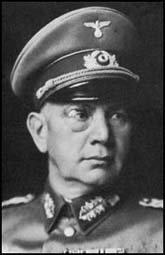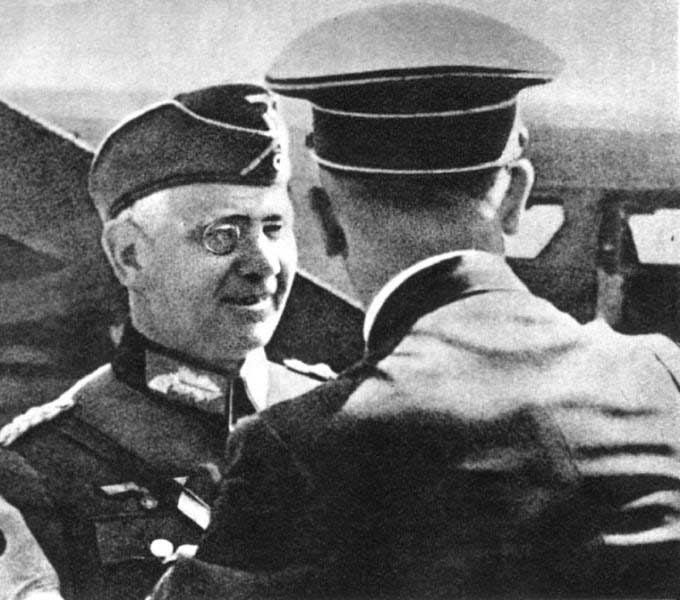|
Field Marshal Walter von Reichenau. 1864-1942
Joining the Army at only 18, Walter became a Fahnenjunker in the Prussian 1st. Guards Field Artillery Regiment, following in his Father's footsteps. He was commissioned in 1904 and made First Lieutenant in 1912, promotion being painfully slow pre WW1. Serving on the Western front, gaining the Iron Cross 1st Class he came out of WW1 as a Captain, thence promotion was steady but nothing startling. By 1923 he was a Major serving on the staff of Wehrkreis VI in Berlin until 1926 when he first visited England, thence another staff appointment in Berlin. This time at HQ, Army Group 1, and named as Commander of the 5^th . Signal Battalion in Stuttgart on November 1 1927, two years later he made it to Lieutenant Colonel. Off to England again but this time to learn the English language, back to Berlin in the autumn of 1929, and named Chief of Staff to the Inspector of Signals whence he stayed till February 1 in 1931. Named as Chief of Staff of Wehrkreis in East Prussia, a year later found Walter a full Colonel. His two years in East Prussia were important, he first met Adolf Hitler in 1932, and he grasped the National Socialists as an indispensable weapon against Marxism, and saw it as an opportunity to advance his own
Reichenau easily influenced his boss General Werner von Blomberg who he introduced to Hitler, who totally captivated the General, and Walter placed himself without any reservation at the Dictator's disposal. Minister of War, and Walter was promoted to Major General to head up the Ministerial Office of the Reichswehr Ministry. Unofficially, he became the Chief Liaison officer between the Nazi Party and the Army, and a Hitler favourite. Reichenau on behalf of Blomberg virtually made a pact with the devil by negotiating with the SS for Army control over 250,000 from Nazi paramilitary organisations given an emergency. He was hoping for peaceful coexistence between the SS and the Army, but watched with growing alarm as SA Chief, Ernst Roehm became more powerful, The SA took control over a principal Veteran's organization Whilst Walter tried to place SA control under the Army it was rejected by Roehm. it looked as if the Army and the Nazi party were on a collision course. Probably at Hitler's behest, Chief of the Nazi Party, Rudolf Hess tried to cool down the situation by penning in the Party's newspaper an editorial that called for the Brownshirts to offer more obedience. General Baron Werner von Fritsch took over as Commander of Wehrkreis from anti Nazi General Kurt von Hammerstein on February 1, 1934. Roehm only worsened the situation by declaring the conduct of war, and mobilization was only the function of the SA , the die was cast as Reichenau had thrown in his lot with the Nazis, should they lose power then his career was finished. The SA must be defeated and Roehm scheduled to die. No doubt, Richenau with both Goering and Himmler acted against Roehm, and the "Blood Purge" of July 30 found 150 Brownshirt leaders shot by the SS. Former Chancellor General Kurt von Schleicher and General Kurt von Brelow were also murdered. The death of Roehm and the killing of the SA leadership consolidated Reichenau's with the Nazi party, a year later he was promoted to Lieutenant General. The 87 year old President von Hindenburg died on August 2, Hitler abolished the office to assume the role of Fuehrer and Reichs Chancellor. Now all 0fficers were required to take an oath not to the Republic or the Constitution, but to Adolf Hitler personally. Reichenau was responsible for writing this oath, it read:
He had sold himself to advance his Army career, he believed totally in himself, all else was secondary. An objection to Reichenau becoming Commander in Chief was the fact he had never commanded anything bigger than a battalion, so Walter with the ear of both Hitler and Blomberg assumed command of Wehrkeis VII in Munich. Keitel took over from him in Berlin. On October 1, 1936 Reichenau was promoted to General of Artillery, and not showing any loyalty to his old mentor Blomberg who ran into a storm by marrying a former prostitute ( made worse by Hitler unknowingly standing as a witness and endorsing this union) our new General stood aside and watched his former boss be pilloried. It would appear that the pair never again spoke to each other. Fritsch was also outed on trumped up homosexual charges leaving the way to the top of the Army Command wide open. Most of the top Army Generals also refused to serve under Reichenau should Hitler grant him the top position in the Army command, so Hitler named Walter von Brauchitach as C-in-C Army. As some sort of consolation prize Reichenau took over Army Group 4 with HQ in Leipzig. He now was in charge of XIV, XV, and XVI Corps, which included all four of Germany's motorised divisions. His Generals commanding these three Corps were Gustav von Wietersheim, Herman Hoth and Heinz Guderian. Reichenau was slated in 1938 to be in charge of the main thrust when Czechoslovakia was invaded, but Britain and France soldout this small nation and a fight thus became unnecessary. When it came to the invasion of Poland, Reichenau was given the task of taking the Polish capital Warsaw but operational chances diverted him from achieving that end, he did perform well, and was awarded the Knights' Cross and made Colonel General. He was ordered to be prepared to move his troops back to Germany, in the plan for invading France, Reichenau's 10th. Army was soon renamed 6th Army and put under Bock's Army Group B and given the He was left with fourteen Infantry Divisions, two Panzer Divisions and one Motorised Division, and took issue with Hitler over the Fuehrer's plan to wait till autumn of 1939 to unleash the Western campaign. He felt very strongly that the oncoming winter would limit the two most lethal weapons, the Panzers and the Luftwaffe. The Western campaign was launched on May 10, 1940 and Reichenau faced part of the Dutch, Belgian, and French armies, and quickly captured the Albert Canal bridges at Briedgen, Veldwezelt, and Vroenhoven, As the Dutch and Belgians retreated, the Allies rushed into Belgium from the south, doing exactly as predicted by Germany. Hitler was ecstatic, the Manstein Plan was working perfectly. On only the second day of the battle, Reichaneau defeated the Anglo-French plan to hold at the Dyle. Units of the French 7th Army crossed Belgium into southern Holland only to clash on May 12 with Reichenau's fast moving forces near Breda. They were unable to link up with the Dutch Army, who were defeated and capitulated on May 15. The Allies committed most of their best troops against the German 6th Army which was not the main attack. Kleist struck the second rate French forces at Sedan and Montherme on May 12, three days later he broke through and Guderian was off on his race for the Channel. Reichenau took Brussels on May 16. It was soon all over in Belgium as the King sued for peace, on May 27 at Chateau Anvaing at 12.20 AM General Desrousseaux surrendered the Belgian Army to Colonel General von Reichenau. This most likely was the high point of his career. This left the French 1st Army in an impossible position as Reichenau cut across its rear and linked with Kluge's 4th Army north of Lille. Six French Divisions were trapped to surrender on May 30. Now, Reichenau was directing some seventeen Divisions which included four Panzer and two motorised Divisions. He drove from Peronne, crossed the Marne and Cher rivers, took Orleans collecting thousands of prisoners. On July 19 in 1940, Reichenau at only 55 was promoted to Field Marshal along with a further eleven other Generals, Hitler going to excess in his promotions, but he wished to enshrine in history this stunning, fast victory in the West against the Allied forces. Now Reichenau was shifted to the Eastern front against Russia, directing in the main, seventeen Infantry Divisions, one light and one Panzer Division. He did well in the fight against the Russian hordes. Reichenau changed in his attitude against the Jews, earlier he was quite friendly towards them, now, he endorsed the SS massacre of Jews at Kiev, cooperating with the dreadful "Einsatzgruppen", the SS He continued to speak his mind on strategic issues to Hitler, offering advice about not attacking Russia, about forming White Russian and Ukrainian divisions to combat the Communists. Hitler rejected this, saying: "Let Reichenau mind his own military problems and leave the rest to me. In November 1941, Field Marshal von Brauchitsch was unwell and clearly needed replacing as C-in-C of the German Army, once again up came Reichenau's name to replace him, but Hitler was unmoved, his response "This Officer is too political for me," this was Walter's third and final rejection, he was never to obtain this coveted appointment. Rundstedt, Commander of Army Group South begged Hitler to agree to a retreat to the Mius River but was refused, Rundstedt resigned and ordered the retreat anyway. Hitler replaced Rundstedt with Reichenau who initially agreed with the Fuehrer and halted the retreat. But in only 24 hours he changed his mind and on his own responsibility ordered the 1st. Panzer Army to withdraw to the Mius River informing Hitler of his decision with " In anticipation of your concurrence..." This "fait accompli" was accepted by Hitler. On January 12 in 1942, the Field Marshal went off on his usual cross country run of several miles in temperatures well below minus 20 degrees Fahrenheit. At lunch he looked ill, he ate a little, signed some papers, and got up to leave, collapsing with a severe heart attack, despite the intervention of specialist medical attention, the Field Marshal had still not regained consciousness five days later. Loaded aboard an aircraft to fly him to Leipzig where a team of surgeons stood by, enroute the aircraft crash landed and Reichenau sustained severe head injuries. On the evening of January 17, 1942 he was declared dead on arrival at Leipzig, he was only fifty seven years old. He is not easy to evaluate as an Army Commander only commanding at the highest level for some six weeks, hardly enough time to soberly judge him. He was not one of Hitler's compliant Field Marshals, but he was intelligent, ambitious and ruthless in pursuit of his career and promotion. As a final judgement, Reichenau never engineered any political or Army move without weighing up its effect on his future as an Army Commander, in this regard he was singularly single minded. Had he lived, he was one FM that may well have curbed Hitler's dictatorship. |

 Born in Karlsruhe on August 16, 1884, his Mother was a Silesian, and his Father a Prussian General. His marriage to a noble Silesian, Countess von Maltzan of Militsch strengthened his ties with Silesia.
Born in Karlsruhe on August 16, 1884, his Mother was a Silesian, and his Father a Prussian General. His marriage to a noble Silesian, Countess von Maltzan of Militsch strengthened his ties with Silesia.